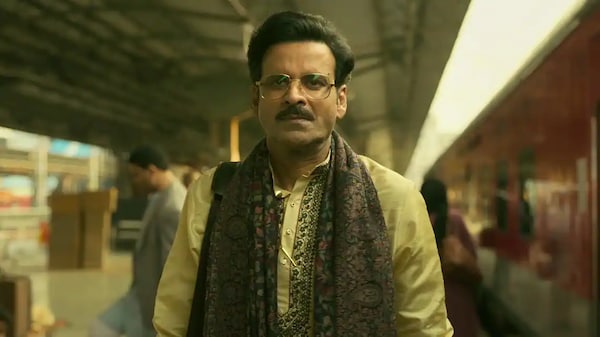'Ray' review: Manoj Bajpayee dazzles in this tribute to Satyajit Ray

- Raja Sen
LiveMint
Last Updated: 06.15 PM, Jun 25, 2021
Satyajit Ray did everything. The legendary director composed music, wrote essays and lyrics, designed and sketched posters, and was both critic and calligrapher. He genuinely wore too many hats to list. He also wrote numerous short, colourful stories—published in sets of 12—and, in the year of his centenary, Netflix has released Ray, a four-part anthology series adapting those lovely, lithe stories.
A capital idea. Unlike Ray’s ever-popular recurring heroes—detective Feluda and scientist Professor Shonku—his self-contained stories remain less read. Here I must recommend an exquisite new Penguin volume called 3 Rays, a gorgeous and hefty book designed by Pinaki De. It compiles fiction by Ray, his father Sukumar Ray and his grandfather Upendrakishore Ray Chowdhury, all translated (and illustrated) by Satyajit himself.
Alarm bells ring, however, with the word “anthology”, now code for Indian streaming platforms to lure and indulge directors between projects. Netflix’s Ajeeb Daastaans had a character saying “Gathbandhan ki shaadi mein sabko compromise karna padta hai (In a marriage of convenience, everyone has to compromise)”, true for that collection where you had to wade through two lousy films to reach Neeraj Ghaywan’s captivating Geeli Puchhi. Ray hurts from unevenness as well, though, divided conveniently into four one-hour episodes, it is simpler to watch only the good ones. Two stories are stunning.
The first two films are by Srijit Mukherji, a Ray devotee whose first film, Autograph, paid tribute to Ray’s 1966 classic, Nayak. The director now takes a defiantly anti-bhadralok stance, turning elegant stories about middle-class Bengalis into lurid affairs. Forget Me Not intrigues with its irresistible premise, then loses its way in melodramatic motives and revelations. Bahurupiya, with stilted dialogues and characters handicapped by not speaking in Bangla, feels tawdry—an x-Ray, if you will. Mukherji treats Ray’s stories like pulp.
All feels lost, till Manoj Bajpayee boards a train.
Abhishek Chaubey directs Bajpayee in Hungama Hai Kyon Barpa, a Ghulam Ali-tinged adaptation of one of my most loved Ray stories, Barin Bhowmick’s Ailment. It is a story of two people who would rather be strangers on a train but, sharing a first-class compartment on a long journey, recall an earlier encounter that scarred them both. Gajraj Rao takes the seat opposite, and these fine performers have a grand old time with this delightfully written story about kleptomania.
Much of Ray’s adventure takes place inside the hero’s head, something Chaubey handles brilliantly by letting Bajpayee not only talk to a mirror but to address an imaginary, admiring audience. Playing a well-known ghazal singer, he’s extraordinary with his body language, from the pompous flicking back of the hair to the way his body stiffens on learning his co-passenger doesn’t grasp his precisely phrased Urdu. Rao, playing a former wrestler once slammed by Dara Singh, matches him hold for hold, keeping the contest riveting.
The chorus of the ghazal Hungama Hai Kyon is about not having stolen or robbed after all, and Chaubey heroes the mot juste delicately, as he once did in Dedh Ishqiya. Rao’s wrestler might not understand the circuitous lyrics but enjoys ghazals about drinking, and Bajpayee speaks of time un-creasing all wounds. Chaubey uses cinematic flourishes sparely but strikingly, once gloriously turning the train compartment into a clock face, complete with a seconds hand ticking underfoot. The genteel film captures the wit of Ray’s words, and, by pointing to a stack of purloined Ray manuscripts, acknowledges how all artists steal. And, evidenced by a magnificent Bajpayee—shifty-eyed as both thief and troubadour need to be—how stealing can be art.
Things get radical in Spotlight, Vasan Bala’s gonzo take on Ray’s story about star attractions and blind faith. The Mard Ko Dard Nahin Hota director starts with a Ray quote about improvisation, as if licensing his departure from the source material. He then plunges us into a preposterous satire about a movie-star known for one iconic facial expression, and a god-woman who wants a plush hotel suite Madonna once stayed in. Buckle up.
Bala deviously casts Harshvardhan Kapoor as the star with one look, easy to buy given Kapoor’s raw filmography, but as he flounders—his spotlight stolen by an all-powerful Didi and her blue-streaked followers—Kapoor gives us a smashing slacker hero, entitled and clueless, using adjectives like “Kafkaesque” and “Lynchian” because they sound cool. Chandan Roy Sanyal has a blast as this star’s all-fixing manager—deliciously named Roby Ghosh—and while Bala goes a touch overboard name-dropping Ray films, Sanyal and Kapoor conjure a familiar rat-a-tat rapport, allowing them to get away with saying things like “Pritish, British” and “Easy, easy rider”. A surprise performer shows up and nearly steals the show, though.
Spotlight is visually thrilling, Eeshit Narain’s camera lurching unsteadily to maintain the vibe, and the lines are wicked: Kapoor, desperate to bribe a hotel manager, offers to take his wife to The Kapil Sharma Show. We are far from the original story about a young man on holiday in Chota Nagpur. With this tightrope walk of a satire, Bala somehow pays tribute to Zoolander and Goopy Gyne Bagha Byne at once.
When Ray had translated his grandfather’s illustrated fable to make Goopy Gyne Bagha Byne, he took a handful of imaginative pages and created his own groundbreaking epic. The master would approve of Bala using a story as a jumping-off point. This film sings its own song, while being a little ode.
Stream of Stories is a column on what to watch online. Raja Sen is a film critic and the author of The Best Baker In The World (2017), a children’s adaptation of The Godfather.
@rajasen

 Premium
Premium